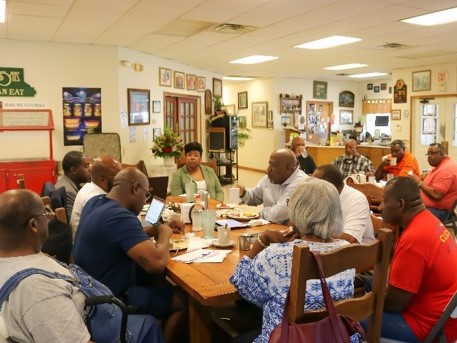Georgia CTSA Leader Explores Lack of Diversity in COVID-19 Trials

“We need to form partnerships with communities, identify those underlying barriers that prevent people from not participating in clinical studies, and then develop strategies to overcome those barriers,” says Dr. Henry N. Young.
Although data shows a higher rate of COVID-19 infection, hospitalization, and death in racial and ethnic minority groups, there is an underrepresentation of these special populations in clinical trials. Henry N. Young, PhD, Kroger Associate Professor, University of Georgia College of Pharmacy, and Co-Director of Georgia Clinical & Translational Science Alliance (Georgia CTSA) Integrating Special Populations program, co-authored a paper about this lack of diversity. This Perspective was published online on August 11, 2020, in The New England Journal of Medicine (NEJM) in "Racial Disproportionality in Covid Clinical Trials".
Dr. Young explains the impetus for the paper, “My colleagues and I were discussing health disparities in the COVID pandemic. COVID is disproportionately impacting certain populations more than others. We thought about the new treatments that were being developed and tested and asked the question of whether or not these treatments are being evaluated among populations that are so adversely impacted by COVID, particularly special populations including African Americans and Hispanics.”
The team reviewed the literature to determine whether or not the testing was reflective of those populations that were hardest hit. Gaps were noticed in the literature, so the team wanted to call attention to the potential disparity. Young says, “Important clinical and translational research is being conducted to improve COVID outcomes, but are we bringing that innovation to special populations that are disproportionately impacted? It’s those populations that suffer from health disparities and need help the most.” These were some of the concepts the team wanted to address in this Perspective. The piece highlights these gaps and identifies challenges that need to be addressed and overcome.
“We want to ensure that when we develop these novel and effective treatments that they are extended to all populations. This highlights the importance of implementing tailored and targeted strategies to ensure that everyone is being equitably represented in these innovative trials. Also, we explored some of the reasons behind the disproportionality in enrollment in clinical trials. Looking back at history, there is an inherent distrust that creates barriers. We need to do a better job at reaching out and engendering trust among all populations, especially when we’re trying to bring innovative strategies to bear that can have a significant impact on health,” adds Young.
Georgia CTSA’s Integrating Special Populations program aims to further advance health equity by efficiently and inclusively extending research testing and discovery to all populations in Georgia, with emphasis on rural health concerns.
The Georgia CTSA is a statewide partnership between Emory, MSM, Georgia Tech, and UGA and is one of over 60 in a national consortium striving to improve the way biomedical research is conducted across the country. The consortium, funded through the National Center for Advancing Translational Sciences (NCATS) and the National Institutes of Health's Clinical and Translational Science Awards, shares a common vision to translate laboratory discoveries into treatments for patients, engage communities in clinical research efforts, and train the next generation of clinical investigators. For more information, click here.